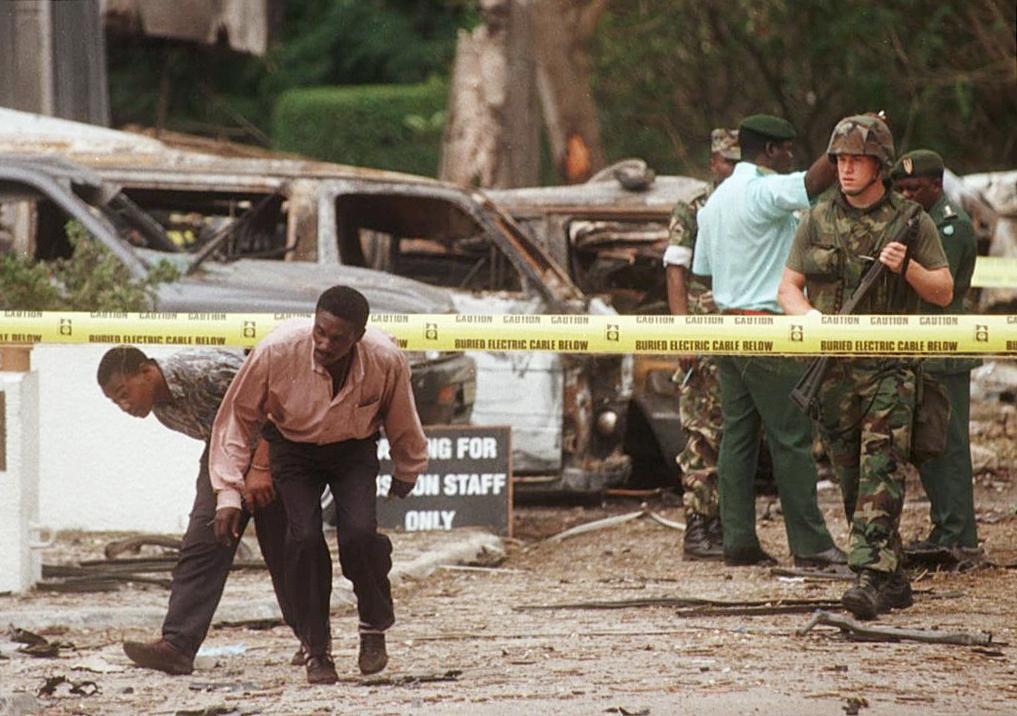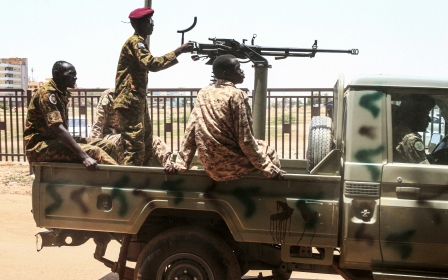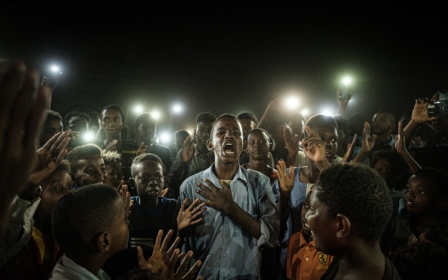Sudan and US reach 'preliminary settlement' over 1998 embassy bombings

Sudan has reached a “preliminary settlement" with the families of the victims in the 1998 al-Qaeda bombings of US embassies in Kenya and Tanzania, Middle East Eye has learned, paving the way for the removal of the East African country from a United States terrorism list.
According to an MEE source, a group of Sudanese lawyers and diplomats have been working closely with the victims’ families to negotiate the terms of the provisional agreement, which is based on what Sudan can realistically afford to pay given the dire situation of the country’s economy.
The two sides have tentatively agreed to a total payout of around $300m, said the source, who requested to stay anonymous due to the sensitivity of the issue.
On Thursday, the US State Department’s top diplomat for Africa confirmed that the US and Sudan had reached a common understanding on the “contours” of a future bilateral claims agreement linked to the 1998 attacks that killed 224 people.
“This final agreement will reflect Sudan’s agreement to pay. It would include compensation in connection with claims relating also to non-US nationals killed and injured in the embassy bombings,” Tibor Nagy, assistant secretary for African Affairs, told a teleconference.
New MEE newsletter: Jerusalem Dispatch
Sign up to get the latest insights and analysis on Israel-Palestine, alongside Turkey Unpacked and other MEE newsletters
'Sudan was never going to be able to pay the existing fine of $6 billion... it has been negotiating a much smaller settlement'
- Cameron Hudson, former US diplomat
His comment followed Monday’s US Supreme Court ruling that Sudan cannot avoid punitive damages in lawsuits accusing it of complicity in the 1998 bombings.
The ruling reinstates about $826m out of a total $4.3bn in punitive damages, said Christopher Curran, a lawyer representing Sudan.
Nagy did not mention a specific amount for the compensations but said those details were being worked out.
“We have discussed obviously numbers with the parties involved, but in no way can we make those public yet,” he told reporters.
Help from the White House
The issue is a key component of efforts between the US and Sudan to normalise relations after decades of antagonism.
Sudan’s civilian-led transitional government has been pushing for rapprochement with Washington since the ousting of longtime autocrat Omar al-Bashir last year. It wants the US to lift sanctions on the African country, and remove it from the State Department's list of "state sponsors of terrorism”.
Since the overthrow of Bashir, President Donald Trump’s administration has made several moves to support Sudan’s new authorities.
In December, US Secretary of State Mike Pompeo said the two countries would exchange ambassadors. Earlier this month, Sudan appointed an ambassador in Washington for the first time in decades in a step hailed as "historic" by the foreign ministry in Khartoum.
Now, the Trump administration is nearing a deal with Sudan to resolve the claims over the 1998 bombings to help clear the way to remove Khartoum’s designation as a state sponsor of terrorism, according to the Wall Street Journal.
The deal under discussion will require $10m to be paid for each US government employee who was an American national when killed, but only $800,000 for each government employee who was a foreign national, the WSJ reported. Injuries for the US nationals would be worth from $3m to $10m, compared with $400,000 for foreign nationals.
However, Sudan’s delisting should occur “as soon as possible” or it could get sidetracked by US domestic events, warned MEE’s source.
“Any delays resulting from the Congress’ summer recess would risk delaying the final resolution of the claims and the delisting, as the administration and Congress would be tied up by the presidential election campaign,” the source explained.
'Uncomfortable' setback
The Supreme Court ruling came as a shock to many Sudanese diplomats, sources said.
Siddiq Abdul Aziz, undersecretary of the Sudanese Foreign Ministry, described the court decision as “unexpected and uncomfortable”, especially given the numerous positive steps the two countries have taken to normalise relations.
“The reopening of this lawsuit by the Supreme Court, after it had been settled by the appeal court, is a setback that may obstruct the other positive steps we achieved so far. But we believe that the entire normalisation process is in the hands of President Donald Trump,” Aziz said.
In Monday's ruling, Justice Neil Gorsuch wrote that for claims made under federal law, "Congress was as clear as it could have been when it authorised plaintiffs to seek and win punitive damages for past conduct."
But Sudan’s justice ministry said it would appeal against the Supreme Court decision.
In a statement on Monday, the ministry claimed that "$7.4bn of the total $10.2bn against Sudan remains subject to further litigation," since the decision ordered the DC Circuit to reconsider its decision that foreign plaintiffs who sued Sudan under state law in the US could not seek punitive damages.
Separation of powers
The Supreme Court decision should not be interpreted as a change in Washington’s policy towards Sudan, or as an effort to delay or undermine Sudan’s efforts to be removed from the State Sponsor of Terrorism List, said former US diplomat Cameron Hudson.
“This was a judicial decision made by our Supreme Court in the absence of reflection on Sudan's internal political situation. These kinds of judicial decisions are not coordinated with the White House or State Department beforehand and should not be seen as a reflection of US policy toward Sudan,” said Hudson, a former chief of staff at the office of the US special envoy to Sudan.
Sudan is on the right track by engaging in “intense negotiations” to reach a final financial settlement on these cases, he said, adding that it’s the “only way to solve the issue” given the country’s inability to pay.
“Sudan was never going to be able to pay the existing fine of $6bn so an additional $4bn is even further out of reach. Sudan has been negotiating a much smaller settlement. This ruling may increase whatever they have to pay but there is no genuine expectation that Sudan [could pay the full amount],” said Hudson, who is also the senior fellow at the Atlantic Council’s Africa Centre.
“If anything, this ruling adds urgency to the need to see Sudan removed from the list.”
Middle East Eye delivers independent and unrivalled coverage and analysis of the Middle East, North Africa and beyond. To learn more about republishing this content and the associated fees, please fill out this form. More about MEE can be found here.




